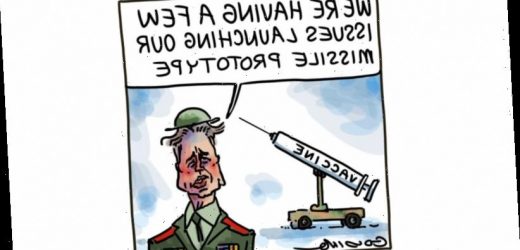VINTAGE WILCOX
Illustration: Cathy WilcoxCredit:
To submit a letter to The Age, email [email protected]. Please include your home address and telephone number.
HIGHER LEARNING
National oversight needed on tertiary curriculum
The downsizing of the science curriculum at tertiary institutions (University of Melbourne, Macquarie University and others) should be of long-term concern to Australia, since all manufactured consumer items, industrial, agricultural, IT, food processing equipment, the foods produced, infrastructure, chemicals and medicines can only be produced through input from science and engineering.
Each university operates in isolation, with decisions on curriculum being made independently. With declining government funding over decades, the decline of the international student market and the lack of access to JobKeeper, all universities are struggling financially. It is no surprise that courses with low student numbers are being cut, irrespective of the national strategic importance of the disciplines affected.
There is a glaring need for a national curriculum oversight body, consisting of representatives from tertiary, industry and government sectors. Such a body should annually assess curriculum offerings across the country to ensure a strategic balance of all disciplines is maintained and to identify where problems in adequate graduate supply might arise from proposed changes to curriculum. Such a body should also advise government on appropriate levels of government funding needed to ensure that universities can operate adequately without having to make curriculum decisions that will adversely affect Australia’s ability to provide adequately trained professionals in the disciplines and numbers required into the future.
Ray Cas, Emeritus Professor, Monash University
Looking for an education not an online experience
Would you rather use your laptop to drool over your favourite dish, or get stuck into that meal on your dining table? The refusal by the managers of our universities to ask that simple question, reveals why our universities are in crisis, as the managerial push to embrace online teaching and learning gathers pace (“Unis stick to online teaching as curbs ease”, The Age, 6/4). As normal people will understand, you may well starve to death if you rely on your device for nourishment.
The best teachers have always understood that teaching is a relationship between people, not machines. Education cannot be turned into a commodity using “online delivery”. Education is not like ordering a pizza. It’s an organic relationship reliant on body-language, spontaneity, humour and instantaneous feedback which is only possible when we meet each other.
Since March 2020, I and many of my colleagues have struggled to engage undergraduate students online. Apart from battling dodgy network connections, significant numbers of fee-paying students either deferred or else did not come to an online class. Of those who “attended” the online small classes, many refused to use their microphones or cameras, or stayed out of the chat room. The sensation of talking to people you can neither see nor hear is eerie. The bean-counters, who imagine they are running a “higher-education market” for people they persistently refer to as “customers”, don’t understand that students want an education not an online experience.
Professor Rob Watts, RMIT University
Undervalued TAFE sector points to dismal future
I agree with Peter Hurley (“In tertiary education, investment reaps rewards”, The Age, 5/4) that Australia’s investment in tertiary education is at risk because of the pandemic. But Australia’s investment in TAFE and the benefits it delivers has long been at risk. It was the diploma I did at TAFE after completing a bachelor degree at university that gave me the skills, confidence and connections to get a job and kick-start my career. But TAFE has long been undervalued and underfunded and the repercussions have been great: increased barriers to affordable and accessible tertiary education, skills shortages, and reduced job opportunities and pathways to employment for millions of Australians, especially young people. The flow-on effect this will have on society and the economy post pandemic is dismal.
Fleur Jacobs, Carlton North
THE FORUM
What track is Hunt on?
Our COVID-19 vaccination rollout is way behind. When will the federal government tell us why? Why are mass vaccination centres only now being planned for NSW? Why must one book online? Why are private companies being paid to organise the rollout? The Australian Defence Force members’ lives depend on good logistics so why not use them?
Why does Health Minister Hunt say we are “on track” when targets have not been reached? What does he mean? Are we on track for more cases and deaths because our targets haven’t been met? Are we on track for further business failures and further specific sector unemployment because we are behind on the rollout?
Can the Prime Minister tell us why we are behind, what are the specific hold-ups in the rollout, what is his team doing to fix them, and what are the new targets?
Dr Tim Woodruff, president, Doctors Reform Society
Denial no solution
Jonathan Crockett (Letters, 3/4), suggested the need for a range of lifestyle changes to avoid a climate catastrophe. He laid out some urgent changes because of inadequate local and global action. Recently 26,000 scientists have also emphasised the need for an emergency climate response and transformative change. The change required to deal with climate change, and other approaching global “tipping points”, must also be communicated to the public. It must be supported by governments – requiring a focus on the future and less on short-term power. Denial of the climate emergency is no solution. Accelerated action using science is required as we now face a global climate pandemic.
Accelerated action means changing our economic system to value nature, incorporating a carbon tax/regulations and other measures to internalise the economic “bads” into decision making. A failure by politicians to support the warnings of science and drive the necessary changes will create major near future disruption.
Keith Altmann, Woodend
Action is affordable
The Australian Academy of Science’s report, The risks to Australia of a 3°C warmer world turns the tables on the pro-business lot who preach that we can’t afford to deal with climate change or the energy transition we have to have. The truth is that we cannot afford not to deal with it. With threats to between 160,000 and 250,000 properties from coastal flooding and billions in commercial, industrial, road, rail and residential assets potentially at risk of inundation, the theme of concern for the “Inundation Recession” that ensues needs to take on the highest profile where everything else subordinately falls into line.
Having now all but lost the chance to limit rises to 1.5 degrees, the urgency needs to translate into strong and dramatic emissions reductions action to counter the possibilities of uninsurable houses and drastic loss of real estate values. It is to be earnestly hoped that the pressure President Biden may be able to bring to bear on our misguided government will have some long-overdue effect.
Robert Brown, Camberwell
Vaccine hurdle
So quick to criticise the Victorian Quarantine Hotel system which they had three weeks to organise. Hunt and Frydenberg have had nine months to organise the logistics of our vaccine rollout and have stumbled at the first hurdle.
John Uren, Blackburn
A free nation
I’m afraid I have to disagree with Chris Young and Amanda Vanstone (Letters, 6/4), we already are a free and independent nation. We make our own laws, pay our own taxes and decide when and against whom we wage war. Furthermore, if this current crop is anything to go by, trusting politicians with a conscience vote would be akin to trusting a tiger not to bite. For goodness sake, if it ain’t broke, don’t fix it. Recent inquiries and royal commissions would suggest there’s plenty of other things that need fixing before we get excited about moving a few bits of furniture around at Yarralumla.
John Mosig, Kew
Petrol price changes
Petrol companies claim steep rises are part of a systematic honest cycle. How then do they explain that for the entire Easter period prices were 32 cents (20 per cent) a litre lower in north-east Victoria.
Doug Perry, Mount Martha
Economic forecasting
It would appear that critics of the Reserve Bank and its governor have now discovered that hindsight is a 100 per cent accurate science. Or as the economist John Kenneth Galbraith put it: “The only function of economic forecasting is to make astrology look respectable.“
Les Anderson, Woodend
Fund investment
The Coalition’s latest attempt at over-regulating the superannuation industry is set to allow the Treasurer to block investments the government does not like. This appears to be a foot in the door by the government to stop super funds investing in renewables and/or green energy at the expense of coal and gas. Super funds already see the coal and gas industries becoming stranded assets and don’t want to invest in white elephant industries. I can only hope that this legislation is blocked or all the offending parts removed.
Alan Inchley, Frankston
Immunisation booths
Vaccination rates are slow. So let’s look at this from a different perspective. We are good at running elections in local areas. Why not swap “election” for “vaccination” and utilise that high-turnover, mass, local election expertise? We can have vaccination centres in school halls after school hours, we can use church halls, town halls and school assembly halls as local council-driven vaccine centres, running evenings and all weekend. This is done on a community level, one-size-fits-all without triaging age groups and pre-existing conditions. Of course, we have medical staff there, and perhaps an improved check-in system as opposed to the printed electoral roll. Let’s take the pressure off GPs and pharmacies, and vaccinate local communities by the thousands every month.
Peter Schmideg, Caulfield North
Act on Myanmar, Ethiopia
Many people in Australia have families in imminent danger in global flashpoint zones, especially with escalating crises around Tigray in Ethiopia, and in Myanmar. A friend’s elderly parents and siblings are in a small Ethiopian town which is now surrounded by well-armed militia. “Never again,” the world has said after every deadly humanitarian catastrophe, but where is the urgently needed intervention now?
With Ireland’s entry to the UN Security Council, the Irish Foreign Minister Simon Coveney is advocating for immediate action on Ethiopia and Myanmar. Australia should strongly support this. “Never again” really has to mean never again: early, preventive action, not words of later regret.
Barbara Chapman, Hawthorn
Explain blood clot figures
Some basic maths can help put this matter in perspective, which epidemiologists need to make clear. The blood clot that has been called into question is very specific, and rare.
The natural incidence of this rare form of clot is about five in one million, or about one in 200,000. This means as occurs normally in the population. Other medical sources give different incidences but not by a great deal.
As quoted, the UK vaccination data says one in 500,000 of those having received the AstraZeneca COVID-19 vaccine have been found to have this form of clot. So according to these figures there is no higher incidence of this rare form of clot in those receiving this vaccine compared to the normal population. Hardly a compelling argument of a link to this vaccine.
Larry Hermann, South Yarra
Leave country alone
Congratulations to ANZ for not signing the letter condemning the violence in Myanmar (“Flak for ANZ snub of Myanmar protest”, The Age, 6/4). The Myanmar conflict is an internal problem for the country itself to resolve. We still don’t know the background to the military coup. To account for it as the military junta’s lust for power is an oversimplification. External support, whether overt or covert, will inflame the situation and may well lead to a million unskilled, uneducated and non-English-speaking economic refugees. Military intervention from the West will certainly bring China and Russia openly into the conflict and result in the death of tens of thousands of people.
The Morrison government’s low-key approach is prudent.
Bill Mathew, Parkville
Get on island buses
Phillip Island at Easter equals cars! One hour’s worth of traffic holdups to get there. There is no other alternative to travel around the clogged island roads than by car. For visitors to one of Victoria’s most popular tourist destinations, it is very frustrating.
On such a weekend what about a fleet of buses? They could constantly circulate from Cowes to San Remo, calling at the Tourist Information Centre, Churchill Island, Rhyll, the penguins, the Nobbies, Smiths Beach, the Wildlife Park and the Nature Reserve. A special spot deserves special attention.
Liz Middleton, Clematis
Morrison guilty of neglect
One can only hope that once the pandemic passes governments are held accountable for their failures. The Morrison government is clocking up a lamentable record: two years after the banking royal commission concluded, many of its recommendations have not been implemented; numerous inquiries into aged care have produced no action; wage growth is non-existent; climate change was ignored in the last budget; and multiple financial scandals, from the sports grant rort to non-competitive tenders for asylum-seeker security and Great Barrier Reef protection.
We have moved from Turnbull’s inability to get anything done to benign neglect.
Richard Aspland, Rosanna
AND ANOTHER THING …
Credit:
Missiles
A $1 billion missile complex makes a very good target.
Les Aisen, Elsternwick
Will Morrison’s missiles use the highly successful “where the bloody hell are you” guidance system?
Matt McRobbie, Mont Albert
Politics
When a government minister says proposed changes to anything is to make it more responsive and fairer for participants, you can bet your bottom dollar that it won’t.
Marie Nash, Balwyn
The Coalition government warns a super increase would come at the expense of wages growth, at the same time it argues against a minimum wage increase?
Peter Baddeley, Portland
What aged care reform needs right now is empathy, from both the federal government and the Australian electorate.
Ruth Farr, Blackburn South
Did ScoMo make a commitment to Jen at the altar or did he show her a road map?
Bernd Rieve, Brighton
Why are the people on the NDIS worried, this government doesn’t act on independent reports, royal commissions or anything that means making an effort.
James Lane, Hampton East
The NDIS – universally supported as an egalitarian advance like Medicare – tinker with it or undermine it at your political peril PM!
Greg Curtin, Blackburn South
Vaccine
Jabless rate currently sitting at around 96.7 per cent.
Greg Lee, Red Hill
I am waiting for the COVID-19 testing sites to also become COVID-19 vaccine sites. I won’t be holding my breath.
Doug Springall, Yarragon
Finally
I look forward to the day when the state government runs Victoria without direction from the AFL. Please explain to me a 50,000 crowd at the MCG, and a 5000 limit for the Anzac Day march; both outdoor events.
Geoff Schmidt, Richmond
The Age’s editor, Gay Alcorn, writes an exclusive newsletter for subscribers on the week’s most important stories and issues. Sign up here to receive it every Friday.
Most Viewed in National
From our partners
Source: Read Full Article




